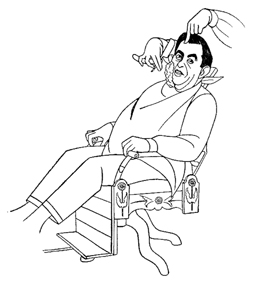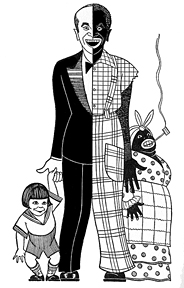Here are 10 things you should know about singer and actress Lillian Roth, born 113 years ago today. She achieved success in vaudeville, nightclubs, concert halls, pictures, radio and on Broadway.
Tag: Woodrow Wilson
10 Things You Should Know About Richard Gaines
Here are 10 things you should know about Richard Gaines, born 119 years ago today. He enjoyed success in the theatre before turning to pictures and then television.
Times Square Tintypes: Al Jolson
In this chapter from his 1932 book, Times Square Tintypes, Broadway columnist Sidney Skolsky profiles the Singing Fool, Al Jolson.
AL’S HERE
MAMMY!!! AL JOLSON. He drinks a bucket of bromo-seltzer every day.
His real name is Asa Yoelson. Got the name Jolson when he was the singing mascot for a regiment in the Spanish-American war. A soldier asked him what his name was. He replied “Yoelson.” The soldier said: “That’s a Swedish name—you’re no Swede. Your name’s Jolson only you don’t know how to pronounce it.” From then on Jolson was his name.
Although he has been married three times women play a small part in his life.
He owns part of the St. Louis National Baseball Club.
His first appearance at the Winter Garden was in the show that opened that theater, Little Miss Innocence. It would be great to record that he made a big hit. The truth of the matter is that he made his first appearance on the stage after midnight and that no one paid any attention to him.
Likes to be patted on the back and is always surrounded by “Yes-men.” It was Walter Winchell who asked: “How many yes-men make a Jolson?”
Is not on speaking terms with his brother Harry. He wishes his brother wouldn’t use his name.
He has to read something in order to fall asleep.
Once started work in a D. W. Griffith picture. Then went to court in order to break the contract. On the witness stand he said: “I knew I was terrible and would never make a hit in pictures.” He was released from the contract. Today he has revolutionized the motion picture industry.
He cracks his knuckles when he is nervous.
His big passion in life is applause. Let an audience encourage him and he’ll break a vocal chord.
As a kid he sang on the streets of Washington and in the backroom of saloons. His boyhood pal at the time was Bill Robinson.
He is known as the second best verse writer in Tin Pan Alley. He doesn’t keep the profits on his songs but donates them to a tuberculosis camp.
Hates cold weather. So much so that one frosty night in Chicago he returned to his hotel room after the evening’s performance of Bombo. While undressing he noticed a sign across the street blinking: “It’s June in Miami. It’s June in Miami.” The next morning he was on his way to Miami, leaving the show cold.
He beams with happiness if anyone compliments him on his ballroom dancing.
Never took a singing lesson until he was past thirty-five. Then stopped after the sixth lesson because he thought they were hurting his voice.
He’s as sentimental as his songs.
Is a great showman and never misses an opportunity. When he arrived in Hollywood to make The Jazz Singer the entire town was at the station to meet him. He sang: “California, Here I Come.”
Mark Hellinger is now writing his life story. Hellinger got all his data when he accompanied the singing fool on his honeymoon abroad. Mark was the odd man.
His favorite word is “baby.”
He bet as much as $100,000 on a horse race and lost.
Never laughs at a joke except to be polite. If the joke really amuses him he says with a serious face, “That’s very funny.”
He knows a kosher restaurant in almost every important town.
Was a personal friend of Presidents Woodrow Wilson and Warren G. Harding. One evening he had dinner with President Harding at the white House. Pork chops was the dish and every time he picked one up the President’s dog, Laddie Boy, would jump and grab it. This wouldn’t have happened if Jolson had been using his knife and fork.
He likes to drive a car fast.
If he ever has a son he wants him to be like Buddy De Sylva.
His favorite game is Hearts. If he loses he makes alibis. If he wins he gloats over the victory.
Times Square Tintypes: John Golden
In this chapter from his 1932 book, Times Square Tintypes, Broadway columnist Sidney Skolsky profiles theatrical producer John Golden.
“PURE AS THE DRIVEN SNOW”
JOHN GOLDEN. He’s the only man who produces clean sex plays. Yet he always manages to give the public what it wants. A shrewd showman, he realizes the value of publicity. Started the “clean” gag because of its healthy box office appeal. It has “it.”
 Was once a bricklayer and the vice president of a chemical company. From the experience gained at the latter he is proficient in making gin.
Was once a bricklayer and the vice president of a chemical company. From the experience gained at the latter he is proficient in making gin.He wrote the song “Poor Butterfly,” with Raymond Hubbell and Charles B. Dillingham. In fact, his managerial career started on a song. His royalty check for “Goodbye, Girls, I’m Through,” was $40,000. Gave it to Mrs. Golden for a present. She loaned it back to him to produce Turn to the Right.
His favorite actor is Muni Weisenfrend. He never says this without adding: “And Otto Kahn agrees with me.”
Is very much interested in what makes an audience go to a play. Once distributed a circular during the run of Pigs inquiring, “What made you attend this show?” Seventy per cent of the answers were variations of “Because a friend told me about it.”
As a bricklayer he helped build the Garrick Theatre.
For the last thirty years the annual Lambs’ Washing has been held on his estate at Bayside.
He was a partner of Cohan and Harris in the production of Hawthorne of the U. S. A. His task was to pal about with Douglas Fairbanks, seeing that the young acrobat didn’t hurdle over taxicabs and climb up buildings.
He is superstitious. Likes to have a numeral in the title of his plays. Remember: The 1st Year, 2 Girls Wanted, 3 Wise Fools, 4 Walls and 7th Heaven. Considers 27 his lucky number. In roulette and other numerical games of chance he will bet huge amount on it.
He organized the Producing Managers Association. This led to the famous actors’ strike.
The man he quotes most is Ring Lardner.
Is not fussy about clothing. Never goes to a store to purchase wearing apparel. If he needs another tie, shirt or suit, he merely telephones for it.
Thinks Atlantic City and Miami are the only vacation spots worth knowing.
He is one of the few producers who treat the theater as if it were a business. Is in his office by nine every morning and leaves at five. Is in bed every night at ten. He never attends the theater in the evenings. Goes only to matinées. Misses every opening night. Even his own.
Owns the original Old Kentucky Home, having bought the Stephen Foster homestead in Federal Hill to save it from being torn down.
He realizes the value of flattery. Gets the most out of people he is associated with by using it.
His favorite tryout town is Elmira, N. Y. Believes it to be lucky and opens all his shows there.
Was the first to cover the front of a theatre with an electric sign. Did it with 3 Wise Fools at the Criterion. Then the movies took up the idea . . . And how!
He hates the word “clean.” Refrains from using it in his conversations. When it slips out accidentally, he looks embarrassed.
He has collaborated on songs with Irving Berlin, Douglas Fairbanks, Oscar Hammerstein, Victor Herbert and Woodrow Wilson.
Always puts on his glasses when he talks on the telephone.
His hobby is collecting “the key to the city.” He has framed in his office keys to twenty-seven of the most important cities in the United States.
He hates dogs and cringes when he sees one.
Has a barber shop in his office, fully equipped. Every day at twelve a barber appears and shaves him. Every other week he takes a haircut.
His home in Bayside has eight bedrooms. He sleeps in a different room each night, according to his mood.

